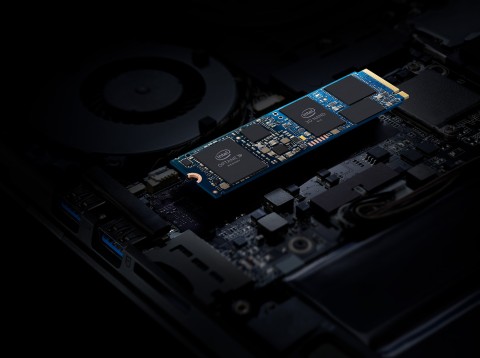What’s New: Today at a gathering of global influencers in Seoul, South Korea, Intel outlined a series of new technology milestones and highlighted its ongoing investment and commitment to advance memory and storage in the data-centric computing era. This includes providing customers with unique Intel® Optane™ technology and Intel® 3D NAND solutions for cloud, artificial intelligence and network edge applications.
This press release features multimedia. View the full release here: https://www.businesswire.com/news/home/20190925005956/en/

Intel in April 2019 introduced Intel Optane memory H10 with solid-state storage. The device combines the responsiveness of Intel Optane technology with the storage capacity of Intel Quad Level Cell (QLC) 3D NAND technology in an M.2 form factor. (Credit: Intel Corporation)
“The world is generating data at an accelerating rate, and businesses are increasingly becoming overwhelmed with how to efficiently process it. Harvesting value from all this data will be critical in separating the winners from losers. It will require cutting-edge innovation in the memory-and-storage hierarchy, which is what we are driving at Intel.”
–Rob Crooke, Intel senior vice president and general manager of the Non-Volatile Memory Solutions Group
What Intel Announced: Among the milestones discussed at the event were Intel’s plans to operate a new Optane technology development line at its facilities in Rio Rancho, New Mexico; the announcement of the second-generation of Intel Optane DC Persistent Memory, code-named “Barlow Pass,” scheduled for release in 2020 with Intel’s next-generation Intel® Xeon® Scalable processor; and Intel’s industry-first demonstration of 144-layer QLC (Quad Level Cell) NAND for data center SSDs (solid-state drives), which are also expected in 2020.
Why It Matters: Massive amounts of data being generated by machines generally require real-time analysis to make that data valuable. This need has exposed gaps in the memory storage hierarchy: DRAM isn’t large enough, and SSDs aren’t fast enough. The gap is where Intel Optane DC Persistent Memory shines. And if even bigger data sets are needed, Intel Optane technology connected through storage interfaces fills the gap.
Additionally, hard disk drives increasingly aren’t fast enough for data-centric computing – that’s where the combination of Intel Optane technology plus QLC NAND comes into play. In sum, Intel Optane is a unique combination of materials, structure and performance that other current memory and storage technologies cannot match.
How Customers Leverage Intel Memory and Storage: Multiple customers are leveraging Intel memory and storage solutions, including Microsoft, which is making significant changes to its client operating system to support the many new capabilities and features that Intel Optane persistent memory delivers, such as fast boot and game loading.
Intel also demonstrated its next-generation Intel Optane technology single-port SSD for key enterprise customers, with product availability expected in 2020.
More Context: Intel Storage and Memory News | Intel Optane DC Persistent Memory Improves Search, Reduces Costs in Baidu’s Feed Stream Services | Intel Optane Technology and Intel QLC NAND Technology Come Together in Single Drive | Intel Announces Broadest Product Portfolio for Moving, Storing and Processing Data | Driving the New Memory and Storage Frontier in 2019 | Faster Access to More Data (Technical Marketing Brief) | Memory and Storage Technical Series (Intel.com)
About Intel
Intel (NASDAQ: INTC), a leader in the semiconductor industry, is shaping the data-centric future with computing and communications technology that is the foundation of the world’s innovations. The company’s engineering expertise is helping address the world’s greatest challenges as well as helping secure, power and connect billions of devices and the infrastructure of the smart, connected world – from the cloud to the network to the edge and everything in between. Find more information about Intel at newsroom.intel.com and intel.com.
© Intel Corporation. Intel, the Intel logo, and other Intel marks are trademarks of Intel Corporation or its subsidiaries. Other names and brands may be claimed as the property of others.
View source version on businesswire.com: https://www.businesswire.com/news/home/20190925005956/en/
